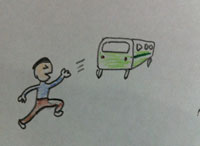Kansai people speak with a distinctive Kansai accent, but it’s hard for non-Japanese speakers to tell the difference of sounds between Kansai-ben and other dialects in Japan. An easy way to notice Kansai-ben is to find some particular vocabularies spoken in a conversation between Kansai people. Try to listen to the five words shown below which are often used in a casual conversation in the streets in Kansai and never be heard in Tokyo. If you use those words to local people in Kansai, they would react with friendly smiles.
- “Okini” is mainly used by a store clerk when a customer leaves, meaning “Thank you”, and the most often used in Kyoto.
- “Metcha” is always followed by an adverb or adjective and increases intensity like “very”. It’s a very useful word to express emotions, exaggerate, and give rhythm to a speech, e.g. Metcha atsui desu. (It’s very hot.) Metcha Oishi desu. (very delicious.)
- “Homma” means “really” in English, so it’s used the same way as “Metcha”. For example, “Homma tsukareta.” means “I’m really tired.” Also using by itself “Homma desu” means “I’m serious.” or “I insist”. and “Homma desu ka?” is a question form “Really?”
- “Akan“, by itself, means “You can’t” or “Do not”, typically used by parents to their child. But it’s also used when you fail or things don’t go as you want them to. For example, you just say “Akan!” when you missed your bus.
- “Nanbo” is the equivalent of the standard Japanese “Ikura” and “how much” in English. You can ask about a price by saying “Nanbo desu ka?”, but better not to use this for things worth over 100 dollars.

Just make sure not to use these words in a formal speech or in any situation where politeness is required. Why not meet our guide members and learn more about Kansai-ben?